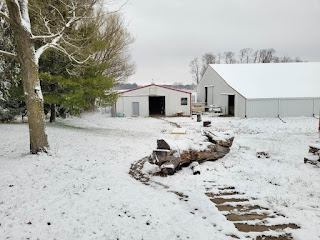First, you need to decide what kind of work you're willing to put into the trailer. Do you have someone who is handy with metal working and repairs? A steel trailer that needs work on the floor, roof, frame, and rust might be a bargain for you. Steel trailers are always going to come with rust and continue to rust unless you take steps to care for them. Aluminum trailers have a rust proof body but can be more expensive, also don't forget that the frame and axles are still steel so you will need to look at the undercarriage of even aluminum trailers for wear.
What about buying new? The big bonus is having a trailer that is 100% road ready and has zero wear and tear. The downside is the hefty price tag.
When buying used you need to find out when was the last time the trailer was moved. This gooseneck might be a fantastic deal, but when was the last time those tires saw road? Do you need to change all four tires before you even hitch it up? Has the wiring been eaten by mice?
To help save weight and length you can chose a trailer without a dressing room. These two trailers are walk throughs with no dressing room. If there's enough room in the nose you can add storage such as a tack trunk or a saddle rack (that would be open to the horses depending on how big the front is and throw everything else in your truck bed.
Of course, having a dressing room is always a huge bonus. It does add weight and length to the trailer which is something to consider for first time haulers or people with smaller trucks.
Here's another option for storage without the added length of a dressing room. This Merhow doesn't have a dressing room but it does have under manger storage. A nice option for storage but can making loading more difficult since you have to either duck out the small escape door, self load, or load your horse while standing in the other stall.
Here's a VERY nicely redone one horse trailer. If your horse will load into the narrow space it would be a great option for someone who doesn't need storage and has a small vehicle.

Here's another rather creative one horse trailer.
Two more options to consider are height and ventilation. An open trailer with lots of ventilation can be more comfortable for your horse in hot weather and provide light which can make loading easier. Height is also an important factor. If you have a 17 hand warmblood you'll need to spring for that extra tall trailer but a shorter horse can save you bucks on shorter trailers.
For someone with a smaller tow vehicle European trailers may be the way to go with their materials, aerodynamic design, and low tongue weight. This Rice brand trailer has a rear and side ramp and is made out of Aluminum so it's both inviting and easy to pull. European trailers have a different design mentality as they are often towed with smaller vehicles yet they feature lots of great safety add ons. This Rice is an antique and is quite difficult to find in the US.
So when it's all said and done you have about a million different trailer options and just as many people with their own opinions about what YOU need. Time to make some decisions!


























